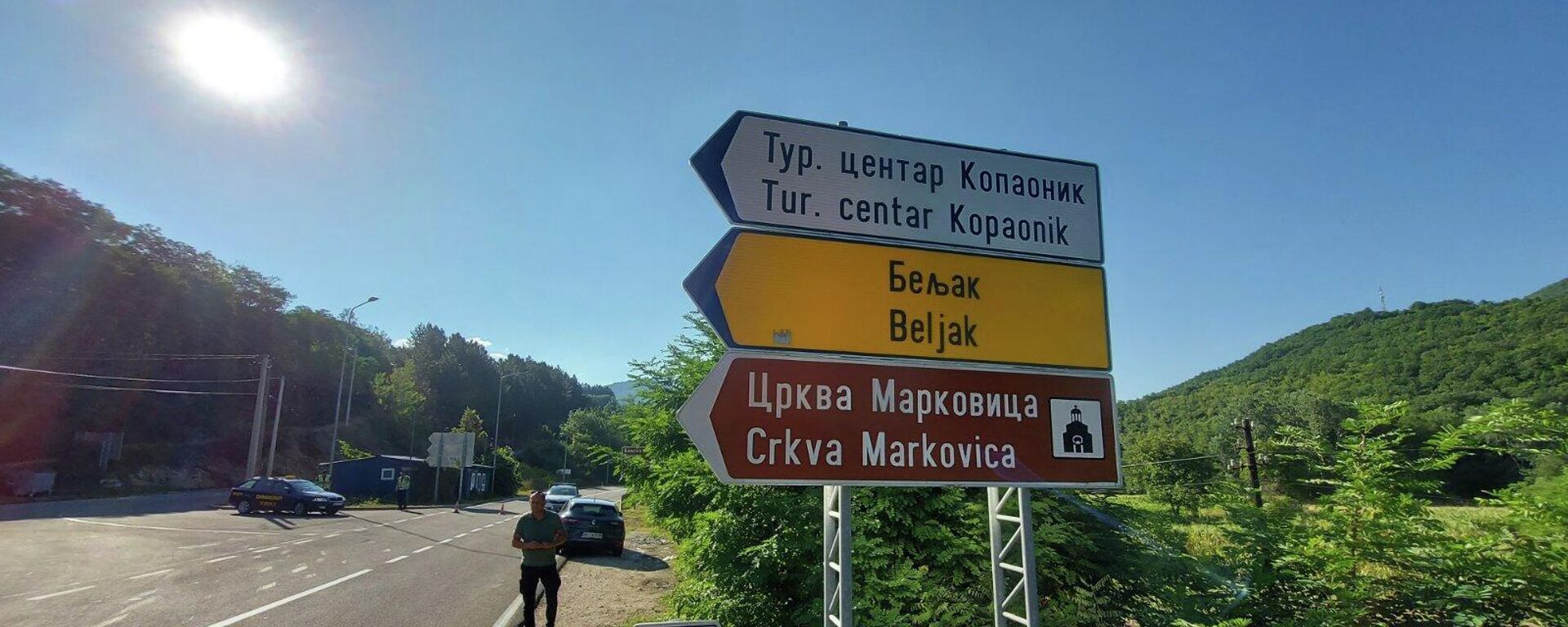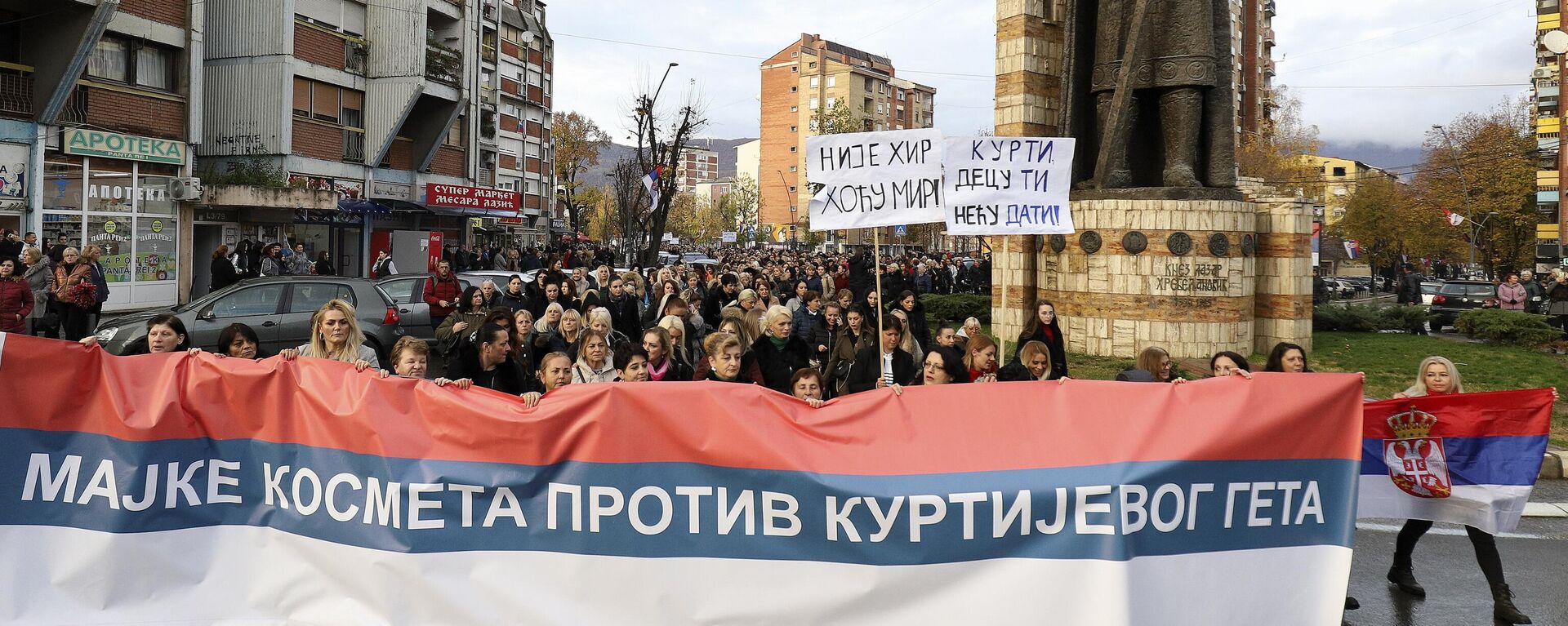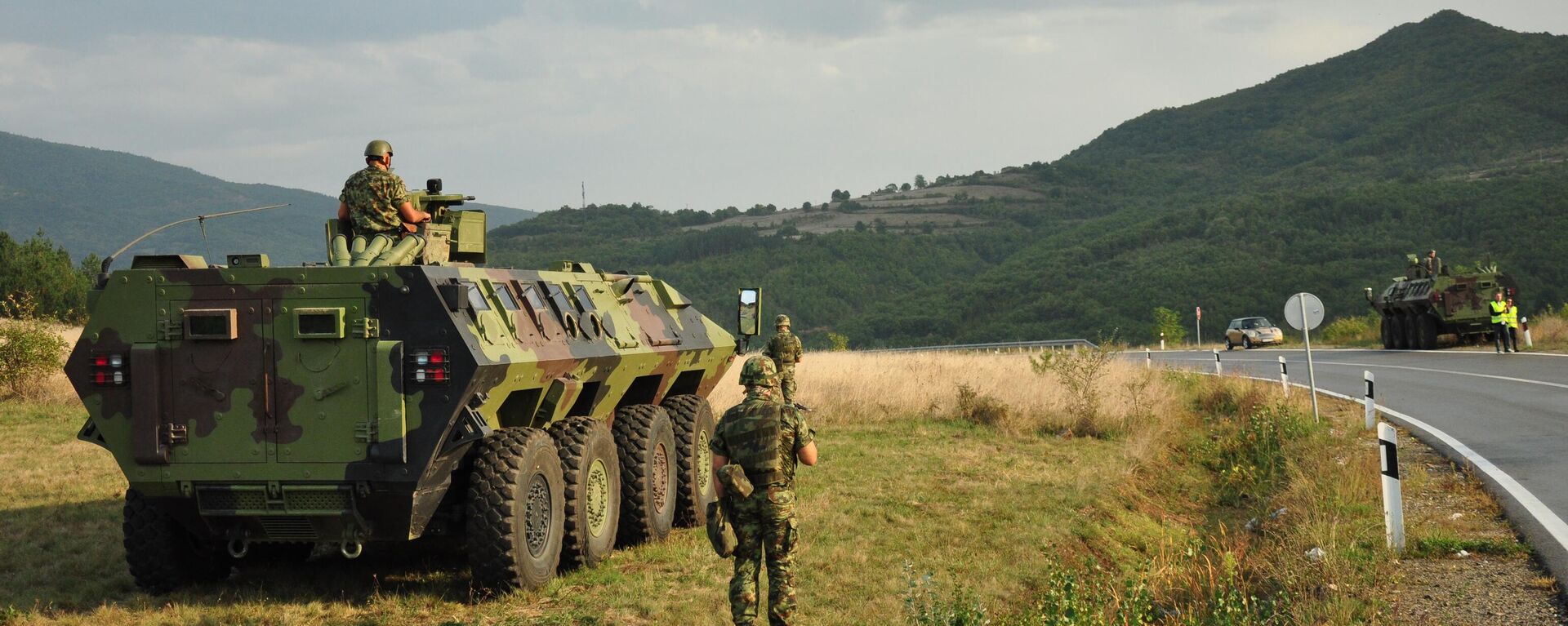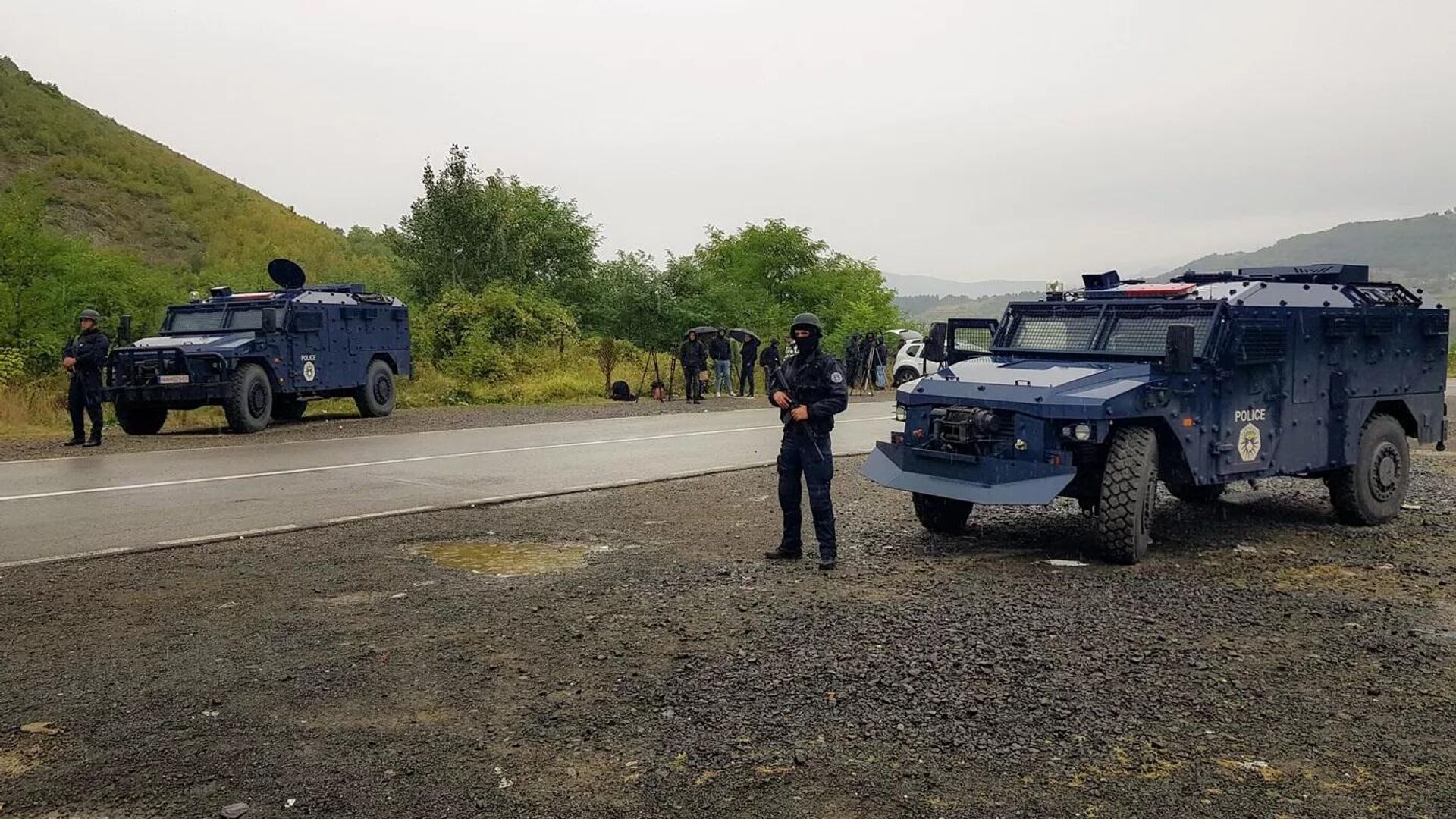https://sputnikglobe.com/20221211/kosovo-police-occupy-dam-rip-up-serbian-flag-threaten-locals-at-gunpoint-as-tensions-surge-1105360057.html
Kosovo Police Occupy Dam, Rip Up Serbian Flag, Threaten Locals at Gunpoint as Tensions Surge
Kosovo Police Occupy Dam, Rip Up Serbian Flag, Threaten Locals at Gunpoint as Tensions Surge
Sputnik International
The security situation in Kosovo began deteriorating this summer, after the NATO-backed separatist government in Pristina declared Serbian-issued license... 11.12.2022, Sputnik International
2022-12-11T15:29+0000
2022-12-11T15:29+0000
2022-12-11T16:03+0000
world
kosovo
serbia
police
deployment
tensions
https://cdn1.img.sputnikglobe.com/img/07e6/0c/0b/1105359874_24:0:1416:783_1920x0_80_0_0_81881442eddb99dc557ec43d0bb708a8.jpg
Heavily-armed Kosovo police equipped with armored vehicles stormed a dam on Lake Gazivode in northern Kosovo on Sunday, tearing down and ripping up a Serbian flag, and kicking a security guard and worker measuring water levels off the premises at gunpoint.The dam, built in 1979, is the largest freshwater reservoir in the region, and generates up to 35 MW in electricity via the twin hydroelectric turbines at the power plant situated at its base.Also on Sunday, residents of the nearby town of Zubin Potok gathered in front of the local municipal village to protest the show of force by Kosovar Albanian police and their mistreatment of the local population.The Kosovar Albanian police deployment comes amid a deterioration of the security situation in Kosovo in recent days, sparked by the detention of an ethnic Serb police officer on "terrorism" charges after he and several of his colleagues quit Kosovo’s police force in protest of Pristina’s discriminatory laws. The arrest has prompted local Serbs to erect barricades in the region’s northern areas to prevent the officer from being taken to Pristina.Over 350 members of the Pristina government’s heavily-armed special police forces were deployed in northern Kosovo this week in response to the protests, occupying the city of Kosovska Mitrovica, and prompting Belgrade to consider returning a 1,000-troop-strong contingent of security personnel to the region to ensure order and guard against anti-Serb pogroms.Serbs consider the deployment of the Albanian Kosovar police units a violation of the 2013 Brussels Agreement, which outlined the rights of the Serbs living in Kosovo.Brussels and NATO have already taken Pristina’s side in the conflict, with EU foreign affairs chief Josep Borrell demanding that the Kosovar Serbs take down their barricades immediately, and the Western alliance threatening to intervene using the NATO-led Kosovo Force "peacekeepers" if the situation gets out of hand.Serbian President Aleksandar Vucic has convened a national security council for Sunday evening to discuss the situation in Kosovo amid threats by the breakaway’s Prime Minister Albin Kurti to attack Serbs manning barricades using "all available means."Kosovo Minister of Internal Affairs Shelal Svecla warned earlier Sunday that police had the necessary capabilities to “take appropriate actions” “at the appropriate time if the barricades are not removed.”Also on Sunday, Russian Foreign Ministry spokeswoman Maria Zakharova accused the European Union of “modeling” the crisis scenario playing out in Kosovo “for years.” This week, Russian Ambassador to Serbia Alexander Botsan-Kharchenko accused Pristina of “methodically…increasing its police presence in the north of Kosovo,” creating a “dangerous” situation in which the local Serb population is intimidated and squeezed out of the region.Kosovo carries a special importance for Serbs, with the 1389 Battle of Kosovo between Serbian Prince Lazar and an invading Ottoman army playing a major role in the formation of Serbia’s national identity.The modern-day crisis in Kosovo began in the late 1990s, after Albanian militants calling themselves the "Kosovo Liberation Army" began a guerilla campaign against Serbian police and troops. NATO intervened in the spring of 1999, bombing the rump state of Yugoslavia for 78 straight days and deploying troops in the region after the withdrawal of Serbian forces. In the 2000s, under NATO patronage, Kosovar Albanians carried out a campaign of ethnic cleansing against the region’s Serb community, destroying homes, historical and cultural monuments and churches, and driving ethnic Serbs to the province’s north. In 2008, again with Western backing, Kosovo unilaterally declared independence.
https://sputnikglobe.com/20221209/serbia-to-consider-return-of-1000-soldiers-to-kosovo-under-unscr-1244---office-for-kosovo-1105259846.html
https://sputnikglobe.com/20221210/serbs-building-barricades-in-northern-kosovo-over-arrest-of-ex-policeman---reports-1105335167.html
https://sputnikglobe.com/20221122/kosovo-serbias-open-wound-1104552715.html
kosovo
serbia
Sputnik International
feedback@sputniknews.com
+74956456601
MIA „Rossiya Segodnya“
2022
News
en_EN
Sputnik International
feedback@sputniknews.com
+74956456601
MIA „Rossiya Segodnya“
Sputnik International
feedback@sputniknews.com
+74956456601
MIA „Rossiya Segodnya“
serbia, kosovo, tensions, deployment, police, protests, dam
serbia, kosovo, tensions, deployment, police, protests, dam
Kosovo Police Occupy Dam, Rip Up Serbian Flag, Threaten Locals at Gunpoint as Tensions Surge
15:29 GMT 11.12.2022 (Updated: 16:03 GMT 11.12.2022) The security situation in Kosovo began deteriorating this summer, after the NATO-backed separatist government in Pristina declared Serbian-issued license plates void. The deployment of hundreds of ethnic Albanian police in the region’s north this week escalated tensions further, prompting Belgrade to consider deploying troops to ensure order.
Heavily-armed Kosovo police equipped with armored vehicles stormed a dam on Lake Gazivode in northern Kosovo on Sunday, tearing down and ripping up a Serbian flag, and kicking a security guard and worker measuring water levels off the premises
at gunpoint.
The dam, built in 1979, is the largest freshwater reservoir in the region, and generates up to 35 MW in electricity via the twin hydroelectric turbines at the power plant situated at its base.
Also on Sunday, residents of the nearby town of Zubin Potok
gathered in front of the local municipal village to protest the show of force by Kosovar Albanian police and their mistreatment of the local population.
The Kosovar Albanian police deployment comes amid a deterioration of the security situation in Kosovo in recent days, sparked by the detention of an ethnic Serb police officer on "terrorism" charges after he and several of his colleagues quit Kosovo’s police force in protest of Pristina’s discriminatory laws. The arrest has prompted local Serbs to erect barricades in the region’s northern areas to prevent the officer from being taken to Pristina.
Over 350 members of the Pristina government’s heavily-armed special police forces were deployed in northern Kosovo this week in response to the protests, occupying the city of Kosovska Mitrovica, and prompting Belgrade to consider returning a 1,000-troop-strong contingent of security personnel to the region to ensure order and guard against anti-Serb pogroms.

9 December 2022, 02:57 GMT
Serbs consider the deployment of the Albanian Kosovar police units a violation of the 2013 Brussels Agreement, which outlined the rights of the Serbs living in Kosovo.
Brussels and NATO have already taken Pristina’s side in the conflict, with EU foreign affairs chief Josep Borrell
demanding that the Kosovar Serbs take down their barricades immediately, and the Western alliance threatening to intervene using the NATO-led Kosovo Force "peacekeepers" if the situation gets out of hand.
Serbian President Aleksandar Vucic has
convened a national security council for Sunday evening to discuss the situation in Kosovo amid threats by the breakaway’s Prime Minister Albin Kurti to attack Serbs manning barricades using "all available means."
Kosovo Minister of Internal Affairs Shelal Svecla
warned earlier Sunday that police had the necessary capabilities to “take appropriate actions” “at the appropriate time if the barricades are not removed.”

10 December 2022, 20:24 GMT
Also on Sunday, Russian Foreign Ministry spokeswoman Maria Zakharova
accused the European Union of “modeling” the crisis scenario playing out in Kosovo “for years.” This week, Russian Ambassador to Serbia Alexander Botsan-Kharchenko accused Pristina of “methodically…increasing its police presence in the north of Kosovo,” creating a “dangerous” situation in which the local Serb population is intimidated and squeezed out of the region.
Kosovo carries a special importance for Serbs, with the 1389 Battle of Kosovo between Serbian Prince Lazar and an invading Ottoman army playing a major role in the formation of Serbia’s national identity.
The modern-day crisis in Kosovo began in the late 1990s, after Albanian militants calling themselves the "Kosovo Liberation Army" began a guerilla campaign against Serbian police and troops. NATO intervened in the spring of 1999, bombing the rump state of Yugoslavia for 78 straight days and deploying troops in the region after the withdrawal of Serbian forces. In the 2000s, under NATO patronage, Kosovar Albanians carried out a campaign of ethnic cleansing against the region’s Serb community, destroying homes, historical and cultural monuments and churches, and driving ethnic Serbs to the province’s north. In 2008, again with Western backing, Kosovo unilaterally declared independence.

22 November 2022, 14:00 GMT





